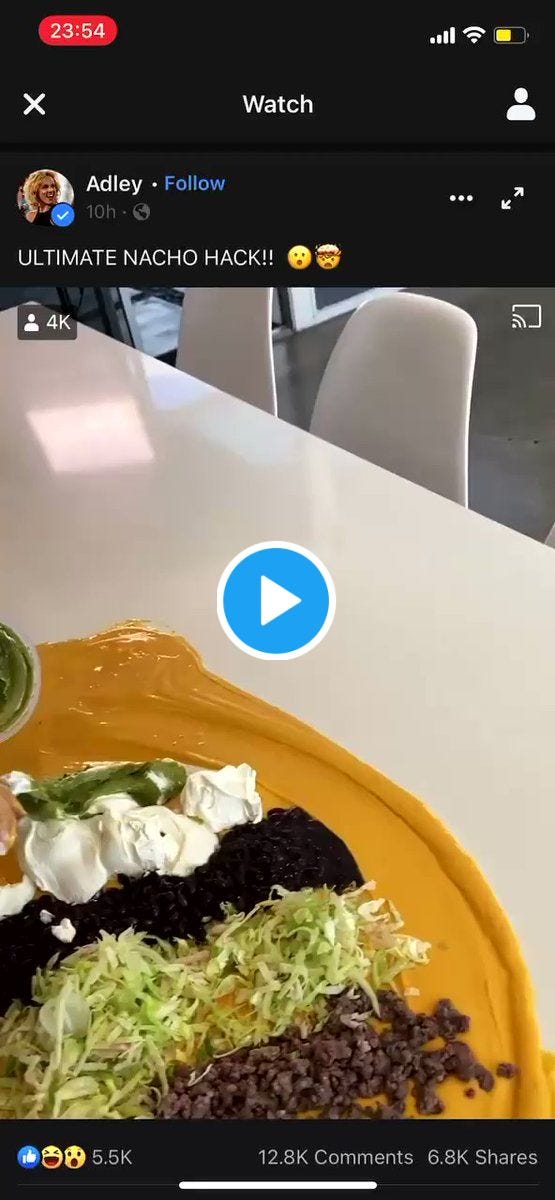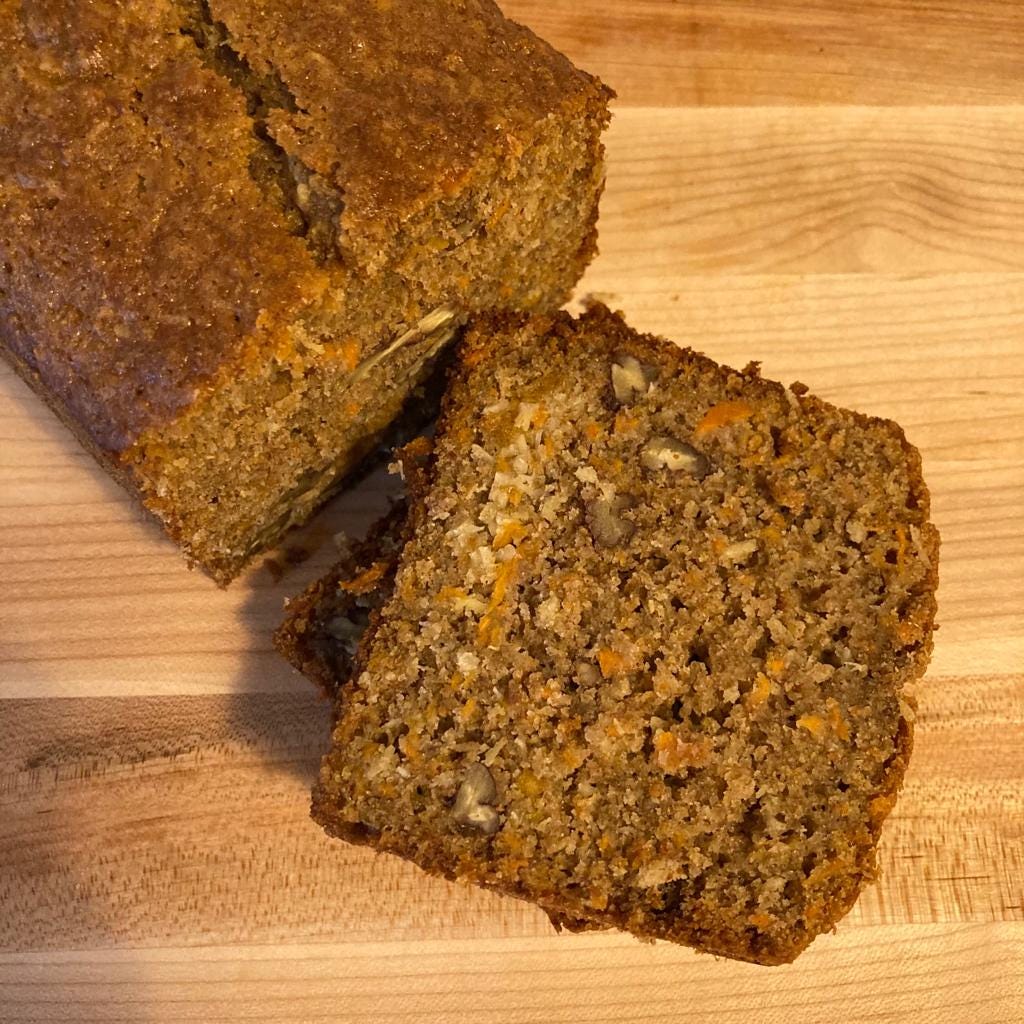Happy Valentine’s Day, friends! ❤️ Stay safe and remember that sometimes a simple kiss can change your life.😘
If someone shared this email with you, sign up here:
I had a eureka moment while gleefully nerding out over the “Surviving the Future” course I’m taking with Sterling College. (Sign up for the Spring edition!) This week we heard from writer and senior fellow at the Post Carbon Institute Richard Heinberg about the silliness of perpetual growth as an economic concept.
He was showing a slide about industrial agriculture, and he said something along the lines of, “And don’t forget — the word unsustainable means impossible to sustain. This form of agriculture is coming to an end, whether we want it to or not.” When so many of the words we use to describe our food — clean, natural, green, super — are meaningless gibberish, it’s nice to have a clear definition to hold onto.
I think often when we apply the term “unsustainable” to agriculture, we mean “bad”. Unsustainable practices cause pollution and erode the soil and contribute to climate change and produce mostly empty calories and are nowhere near as efficient as peasant agriculture, and that’s all definitely bad. But more importantly, this form of agriculture is “impossible to sustain.” Eureka!
Burning the Midnight Oil, Coal, and Gas
What makes the Western industrial agriculture system truly impossible to sustain is its complete dependence on fossil fuels. It took me a long time to wrap my head around the fact that there is a finite amount of oil and coal and natural gas in the ground. Fossil fuels are like gold or diamonds. The Earth got made with a set amount, and when we use it all up, that’s all she wrote. It’s scary but important to consider what that means for the future. A fossil fuel-powered civilization can’t survive… without fossil fuels.
While scientists don’t actually know how much oil is left, it seems clear that the supply is drying up. If there was still plenty of easy-to-access oil and natural gas left, then fracking wouldn’t be a thing. Even accounting for renewables, we must reduce our energy consumption for civilization to continue. That probably means no more airplanes spraying pesticides or year-round access to strawberries.
A Better Definition
Quitting an addiction to fossil fuels won’t be easy, and it can’t just be done cold turkey. And that brings me to the true definition of sustainability: meeting my needs and society’s needs without compromising the future.
Sustainable practices can be done in perpetuity, without leaving my grandchildren to battle through a dystopian nightmare. There are many possible agricultural futures that can provide us with a softer landing into a post-fossil fuel future. Some models I am enamored with are Sylvanaqua farm’s vision for collective land management based on indigenous principles; the farmer-first mission of A Growing Culture; and the small-scale, appropriate technologies from ECHO (which is the charity for you if you love agricultural innovation and JESUS). We have options. But first, we need to accept that fossil fuels are a bad boyfriend and we should have ended it ages ago.
love,
Jackie
If you really love us, you’ll share this newsletter with a friend 💋
🐄 Farming Vocab: Part 1
While we’re defining things, here are some common words you might here to describe agricultural practices. We’ll add more next edition.
1️⃣Monoculture is the cultivation of a single crop on an area of land. This can increase efficiency in crop management and harvesting, but also increases occurrences of pests and disease. 2️⃣Polyculture is the cultivation of a diversity of crops (plant and animal) on an area of land. This increases biodiversity and mimics natural environments.
3️⃣Industrial agriculture is how most of our food is produced in America, and increasingly across the Western world. It is categorized by large-scale monoculture (see below), intensive use of synthetic (usually fossil fuel-derived) pesticides and fertilizers, and confined animal operations (CAFOs). The major industrial crops produced in the US (by value) are corn, beef, cow’s milk, chicken, and soybeans.14️⃣Extractive agriculture uses up resources and destroys environments. Practices contribute to soil degradation and water and air pollution. Industrial agriculture is an extractive industry.
5️⃣Organic agriculture employs only naturally occurring forms of pest control and fertilization (nothing synthetic). Common practices include composting, cover-cropping, crop rotation, and fertilizers made from plant and animal waste. To legally call yourself an organic farm in the U.S., you must be certified by the USDA, a fairly rigorous and costly process.
6️⃣Peasant farming is how the world’s poor grow food. It is small scale and resource-efficient. It is a traditional means of self-sufficiency, with farmers growing food to feed themselves and their families first, and then as a means of generating income. While most of the food grown on the planet is produced by industrial agriculture, this is only because the industrial system excels at producing empty or unnecessary calories (crops that end up becoming snack foods, soda, and animal protein) for the wealthy. 70% of humanity gets the majority of its food from the peasant food web, even though these farms take up just 25% of agricultural land.2
🥜On Peanut Butter | From the Desk of Alicia Kennedy
The always insightful food writer Alicia Kennedy has noticed that readers don’t freak out as much anymore when she recommends eating less meat. Vegetarianism is no longer controversial. However, when Kennedy suggests switching to tasty natural peanut butter — her audience loses their motherflippin’ minds.
She understands why. Jif and Smuckers are part of the same company now, but a brand can’t upset the people who might pledge allegiance to one peanut butter over another). Nostalgia and convenience keep us from examining ingredients too closely and get us stirred up when somebody suggests changing habits.
And that’s a problem with peanut butter because it contains palm oil. No matter what corporations claim it’s about impossible to sustainably source palm oil. (And we’re talking about large food-processing corporations here, not alllllll palm oil). The ingredient is associated in the Global South with deforestation, child labor, and the pernicious agricultural practice of monocultures. Natural peanut butter isn’t nostalgic (although Smucker’s sells its own natural version). Natural peanut butter isn’t convenient (a new jar requires stirring before use). But as Kennedy puts it, in the global food system, we should strive for more than just the most accessible option. We should demand a peanut butter that’s better for everyone.
🚜🇮🇳Indian Farmer Protests - If You Don’t Know, Now You Know | The Daily Show
The farmers’ protest in India, the largest protest in history, has become international news after violent clashes between the government and agricultural workers. The rallies have gained so much attention in the past week that international stars like Rihanna and Greta Thunberg have expressed their support for the farmers on social media. In turn, pro-government Indians burned effigies of both celebrities!
But the impetus for the protests began months ago when far right Prime Minister Narendra Modi announced changes to farming laws that will make it easier for big corporations to enter and control the market. Indian farmers already were struggling due to economic factors even before Modi proposed the new laws, with debt and suicides rising. To fight back, India’s farmers have strength in numbers: 600 million Indians (half the country) work in agriculture. They’ve been blocking major roads into the capital Delhi to shut down major hubs of the country to try to stop the enactment of the laws.
Nobody knows how it’ll end, and farmers say they’ll keep protesting on the highway for years if necessary. This short video from the Daily Show explains how deregulating the market can devastate a country that long has thrived on the crops of small farmers.
🍝Uh Oh, Spaghetti-Os: The Absurd Logic of Internet Recipe Hacks | The Atlantic
Has anyone ever passed along a food video where a home chef cooks up something absolutely nauseating? Amanda Mull watched a food hack Facebook page where a woman dumped a can of Spaghetti-Os into a frozen pie crust and made Spaghetti-Os pie. After a couple of weeks, the video had 43 million views on Twitter and Facebook. Mull started investigating why people make these videos and why millions watch them.
A philosophy professor who studies food and moral judgment told Mull that she believes these videos succeed because they subvert expectations but not in a radical way. The videos are what cognitive anthropologists call “minimally counterintuitive.” That leads to another reason these videos go viral. When audiences watch somebody messing up in the kitchen or making something gross and unexpected, we want to laugh at them (and maybe imitate them). Usually with our friends.
Making revolting recipes can help content creators “amass an audience, sell sponsored content, make endorsement deals, and run ads.” Is it all just a joke though? The same woman who made the Spaghetti-O pie also makes a Sprite pie, which has rave reviews by commenters (and borrows a bit from food history).
We’ve added a new section to the newsletter, a rundown of upcoming classes and other food events happening virtually or in South Florida. Feel free to email us with calendar submissions!
Dishes of Africa and the African Diaspora | Feb. 13 | Free | University of Florida
Kojicon | Feb. 22 - March 7 | $20-100 | Yellow Farmhouse Education Center
Black Food Mattes: Racial Justice in the Wake of Food Justice | Feb. 25 | The New School
Cooking Class with Chef Clay Conlay of Buccan | March 4 | $65 | Kai Kai Farm
Cooking Class with Chef Tim Lipman of Coolinary Cafe | March 8 | $65 | Kai Kai Farm
Intro to Winter Gardening in South Florida | $20 | Virtual | Little River Cooperative
Submit an event to sunshineandmicrobes@gmail.com
Sourdough Carrot Cake
This is a real everyday cake. Not too indulgent to eat for breakfast, but could easily be jazzed up with some cream cheese frosting for a special occasion.
Ingredients and special tools
3 cups grated carrots (grate with large holes on box grater)
1 cup granulated sugar
1 cup olive or neutral cooking oil
1 1/2 cups sourdough starter (doesn’t matter is it’s active or discard, but the longer it’s gone without feeding, the more sour it will be)
3 eggs
1 teaspoon vanilla extract
optional: 1 teaspoon citrus zest
1 1/2 cups whole wheat pastry flour (feel free to substitute other flours)
1 1/2 teaspoons baking powder
1/2 teaspoon baking soda
1 teaspoon cinnamon
1 teaspoon cardamom
1 teaspoon salt
optional: 1 cup pecans, 3/4 cup raisins, and/or 1/2 cup shredded coconut
optional: stand mixer with paddle attachment
step-by-step
Preheat oven to 350°F.
Line a 9x13 pan or 2 regular loaf pans with parchment paper. Grease paper with a thin massaging of cooking oil.
Mix together sugar, oil, sourdough starter, eggs, vanilla extract, and zest. Ideally, do this in a stand mixer with paddle attachment for 3-5 minutes. This will produce a cake with a lighter texture. If not, whisk by hand until ingredients are thoroughly combined, or with a handheld electric mixer.
In another bowl, mix together flour, baking powder, baking soda, spices, and salt.
Take 2 tablespoons of flour mixture and add to grated carrots, mixing to coat. This will keep carrots from sinking to the bottom. (Thanks to The Clever Carrot for this tip!)
Add flour mix to wet ingredients and mix until just combined. Then add in carrots and any optional add-ins, mixing until just combined.
Add batter to the prepared pan.
Bake for 75 minutes, or until a toothpick comes out clean when inserted into the top.
Let cool completely before cutting into the cake (or else the texture might be on the mushy side).
The most respect I’ve ever had for a Cowboys fan.
Talk to Us
Send in your comments, mailbag questions, recipe mishaps, or cooking tips: sunshineandmicrobes@gmail.com. Also do us a favor and follow us on Facebook and Instagram. Visit our website and cook yourself something nice.
If you enjoyed this issue, please share it with others.
Sunshine + Microbes team
Jackie Vitale is a cook and kitchen educator based in Stuart, Fla. She is co-founder of the Florida Ferment Fest. Her newsletter explores the intersection of food, culture, environment and community.
Matt Levin is a communications specialist at the ACLU of Texas. He edits Sunshine + Microbes and contributes other scraps to each issue.
https://en.wikipedia.org/wiki/Agriculture_in_the_United_States
https://www.resilience.org/stories/2019-08-21/small-farms-dont-produce-most-the-of-the-worlds-food-but-they-could-produce-all/













